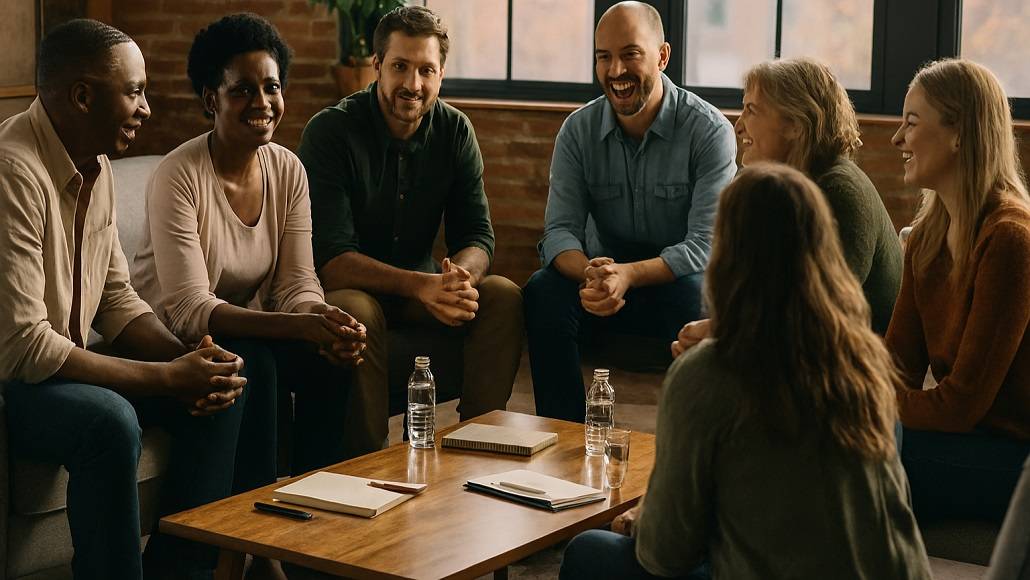Sobriety is more than just quitting alcohol or drugs—it’s about building a new life. Recovery involves changing habits, beliefs, and often relationships. And while personal strength matters, you don’t have to do it alone. A supportive community can make all the difference in maintaining long-term sobriety.
Research and personal stories show that connection is the heart of recovery. Whether it’s a support group, a friend who understands, or an online forum, having people around you who believe in your journey provides strength, safety, and purpose.
Why Community Matters in Recovery
When someone is trying to stay sober, isolation can be one of the biggest challenges. Shame, guilt, or fear of judgment often push people away from others. But recovery thrives in connection—not in silence.
According to the National Institute on Drug Abuse (NIDA), people in recovery who engage in peer support are more likely to stay sober and less likely to relapse NIDA, 2022.
Community gives people a place to:
- Share honestly without fear of judgment
- Learn from others who have walked the same path
- Celebrate progress, big or small
- Feel less alone during difficult moments
The Science Behind Connection
Humans are wired for connection. Our brains release oxytocin, the “bonding hormone,” when we feel safe and supported by others. In contrast, loneliness can activate stress responses that lead to cravings and relapse.
A study published in Alcoholism: Clinical and Experimental Research found that people who had strong social support were more likely to achieve long-term sobriety than those who tried to recover alone Kelly et al., 2017.
Recovery isn’t just about willpower—it’s about building a life that feels worth staying sober for.
Types of Supportive Communities in Sobriety
There’s no one-size-fits-all community. People find support in many different places. Here are a few common ones:
1. 12-Step Groups (like AA or NA)
Tried and tested, Alcoholics Anonymous (AA) and Narcotics Anonymous (NA) provide regular meetings, sponsorship, and a spiritual approach to healing. The structure and accountability can be powerful tools in long-term recovery.
According to AA’s 2020 Membership Survey, over 27% of members reported over 10 years of continuous sobriety, showing the strength of long-term involvement.
2. Non-12-Step Groups
Some people prefer secular or alternative programs, such as:
- SMART Recovery: Focuses on cognitive-behavioral techniques
- Refuge Recovery: Uses mindfulness and Buddhist principles
- Celebrate Recovery: Combines Christian faith with recovery tools
These groups offer community without requiring belief in a higher power, which can be a better fit for some.
3. Therapy and Group Counseling
Group therapy combines professional guidance with peer support. It’s especially helpful for people dealing with co-occurring disorders like anxiety, depression, or trauma alongside addiction.
Many outpatient and rehab programs offer these group sessions as part of aftercare.
4. Sober Living Homes
These are structured, substance-free living environments where people in early recovery live together. Residents hold each other accountable, share chores, and attend recovery meetings. It’s a supportive bridge between treatment and independent living.
5. Online Communities
With the rise of digital connection, support is just a click away. Online groups offer 24/7 connection through forums, apps, and social media. Some popular spaces include:
- Reddit’s r/stopdrinking
- The Luckiest Club
- Soberistas
- Tempest Sobriety School (now RizeUp)
These platforms help people connect, especially those in rural areas or those who prefer anonymity.
How Community Helps Prevent Relapse
Relapse is often triggered by stress, isolation, or emotional pain. Being part of a community helps prevent relapse in several ways:
1. Accountability
When others check in on you—or when you show up for someone else—you’re less likely to fall back into old patterns.
2. Encouragement
Rough days are part of recovery. Having someone say, “You’ve got this,” can be the nudge that keeps you going.
3. Perspective
Talking with others who’ve experienced similar struggles can remind you that you’re not alone—and that recovery is possible.
4. Structure
Regular meetings, phone check-ins, and social events give your life rhythm and routine, both of which are essential for long-term recovery.
Finding the Right Community
The best community is the one where you feel safe, seen, and supported. Here are a few questions to guide your search:
- Do I feel comfortable being myself here?
- Are people respectful and non-judgmental?
- Can I see myself building relationships with these people?
- Does this group fit my values and recovery goals?
It’s ok to try a few different groups before finding your fit. Recovery is not about perfection—it’s about progress.
Tips for Building Supportive Relationships
- Show up regularly – trust builds over time
- Be honest – vulnerability invites connection
- Support others – giving help often strengthens your own recovery
- Keep an open mind – people may come from different paths, but their stories matter too
What If You Don’t Have Support?
Not everyone has family or friends who understand addiction. But that doesn’t mean you have to recover alone.
Start small:
- Attend a local meeting
- Join an online support group
- Talk to a therapist or peer recovery coach
- Read recovery blogs or memoirs
Even one connection can spark change.
Final Thoughts
Recovery is not just about removing substances—it’s about rebuilding a meaningful life. And that life is richer when shared with others. A strong, healthy community offers strength on hard days and joy on good ones.
Sobriety becomes sustainable when you no longer feel alone.
In the words of Johann Hari, “The opposite of addiction is not sobriety—it’s connection.
References
- National Institute on Drug Abuse (NIDA). (2022). https://nida.nih.gov
- Kelly, J. F., & Greene, M. C. (2017). Alcoholism: Clinical and Experimental Research. https://onlinelibrary.wiley.com/journal/15300277
- Alcoholics Anonymous (2020). Membership Survey Results. https://www.aa.org


















